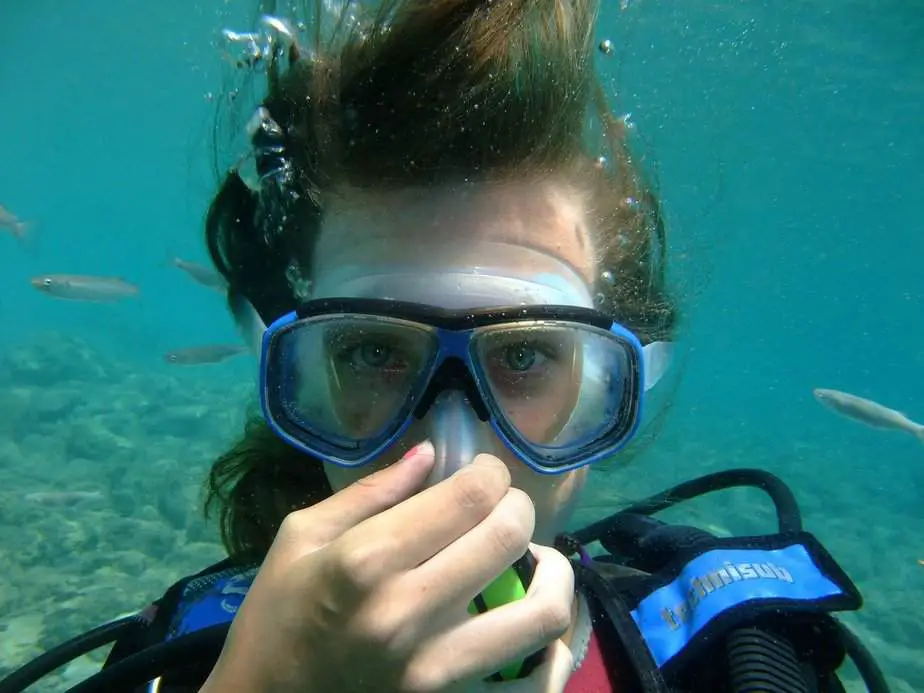In our daily life, we don’t really think of a cold as much of a threat. Obviously, it’s something you want to avoid if possible, however if you do catch a cold, you won’t think of it as some kind of fatal sickness. Even if you caught a cold before or during a vacation (which is very probable due to sitting in a packed plane and being exposed to foreign bacteria), you probably wouldn’t cancel it, especially if you’ve been planning it months in advance. How does a cold impact your scuba diving trip?
Can you scuba dive with a cold? A cold can cause your sinuses to be congested, and this can lead to some serious problems in relation to equalizing your ears and suffering ear barotrauma. Congested sinuses can make it difficult to equalize the pressure differential inside your mask and ears, and it can also lead to a very deadly reverse squeeze. As such, we do NOT recommend anyone scuba dive with a cold, because the worst case scenario is very dangerous.
In this article, we will go over how a cold will affect your ability to scuba dive, as well as the most dangerous aspects of having congested sinuses while diving. We’ll also provide some tips on how to reduce the likelihood of getting a cold and how you can alleviate its symptoms when you have it.
Risks of diving with a cold
When you have a cold, you will generally feel unwell as you exhibit such symptoms as: runny or stuffy nose, sore throat, congestion, fever, headache, sneezing and coughing.
Just reading about the symptoms, can you already get an idea of why it’s a bad idea to dive with a cold? Imagine contending with a stuffy nose, sneezing, and coughing while dozens of feet underwater. That’s not even the worst part of it. The symptom that we are really worried about is congestion.
Difficulty breathing
When you have a cold, your body will defend itself by producing mucus, which can get lodged in the airways. This gives you a feeling that your throat and sinuses are full, which can make breathing labored or uneven.
Your sinuses will become congested because there will be an increase of blood vessels surrounding your sinuses, causing them to swell and restrict your breathing even further. These effects can really hamper your ability to breathe in deeply and slowly, which is crucial for getting sufficient airflow. This is more than just a hindrance; this is very dangerous.
Inability to equalize your sinuses and middle ear

In addition to difficulty breathing, you will have problems with equalizing. A sinus squeeze is one such problem that can arise.
What is a sinus squeeze? It is when, during your descent, you struggle to equalize the pressure differential between your sinuses and the surrounding environment. This is incredibly painful, and you will likely abort the dive long before the pain becomes unbearable.
The inability to equalize your middle ear follows the same idea, but affecting your inner ear instead of sinuses. Similarly, you will also end the dive before you suffer ear barotrauma such as a ruptured eardrum.
Neither of these problems are a big deal. You will dive a few feet underwater, realize that you cannot equalize and that the pressure is starting to feel painful, and you quickly return to the surface before anything drastic happens. Annoying, but not a serious problem.
Reverse squeeze
What is truly a serious concern is when you encounter a reverse sinus squeeze. This is when you actually succeed in equalizing your sinuses during the descent, but by some stroke of bad luck, now you are struggling to equalize them on the ascent.
Why is this such a concern? Well, let’s say you’re 18 m (60 ft) underwater or possibly even deeper (which would make the situation a lot worse). As soon as you go up a few feet, you realize that you are unable to equalize and so you must remain at depth until you can.
Well, now your air is running out much faster compared to at a higher depth, more nitrogen is being absorbed into your system which increases your chances of decompression sickness, and if you cannot equalize, you’re just going to have to endure massive barotrauma and try to surface regardless because you’re running out of air. You’ll also likely get decompression sickness because it’s doubtful you’ll have enough air to do any deco stops. To say that this is a terrifying experience is an understatement.
If it isn’t obvious already, the scenario described above can result in a fatality. In that situation, each option is a bad choice – stay longer underwater trying to equalize and run out of air, or ascend and get decompression sickness as well as numerous barotrauma injuries.
Can’t I just take a decongestant and go diving?
So, after reading about all the risks associated with scuba diving with a cold, you are still hoping that medication will make things alright? Maybe it will, maybe it won’t, but do you really want to take that risk? Here’s the best case scenario of what will happen if you take some decongestants for scuba diving.
First, if you aren’t fuzzy in the head already from the cold, the decongestant will likely make you woozy. There’s a reason why, for a lot of medication, they recommend you not operate heavy machinery or drive after taking it. Maybe the label should also add “don’t scuba dive” to the label as well.
Second, depending on how deep you are diving, you may also experience some nitrogen narcosis which is a bit like getting drunk. It can cause you to make bad judgment calls or turn you outright delirious. Narcosis is already a safety risk for a normal, healthy diver, and combine that with your weakened state, you will be acting downright idiotic.
Third, medication affects everybody differently. Plus, now we’re adding water pressure to the mix. Do you know if it will retain its normal potency? What if it suddenly wears off, and you are stuck dealing with equalization issues?
It seems like a decongestant would put you on a disastrous path toward a reverse squeeze by helping you equalize during the descent, wearing off sometime during the dive, and leaving you to your doom when you are struggling to equalize while ascending.
Hopefully it’s become quite clear that you should NOT be scuba diving if you’re sick. Personally, as soon as I start to feel a little under the weather, I cancel the dive without hesitation. I’m not willing to gamble with my life like that.


